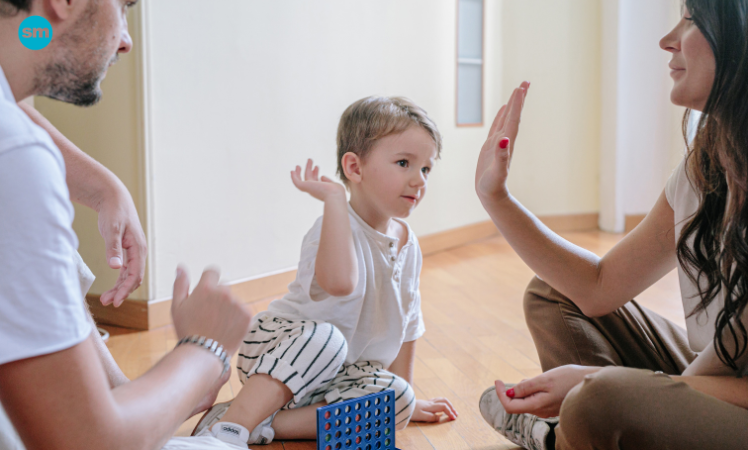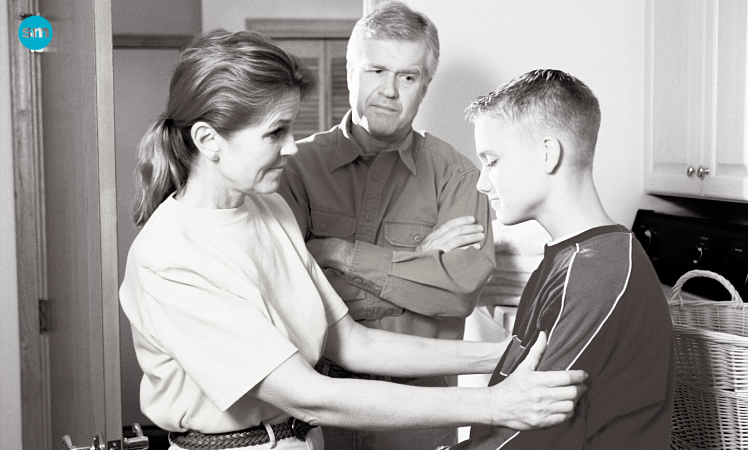Co-Parenting Boundaries In New Relationship

Last Updated on January 24, 2024 by Lori Pace
There are families which have one biological and one step-parent. This is a growing family unit and you are not the only one considering a blended family. For little ones, blended families can work wonders for them. Step-parents can even be as important as their biological parents. It doesn’t necessarily mean that it will be easy for your partner or your children. Setting boundaries for co-parenting with your partner for new relationship is one of the most difficult aspects of blended families.
What Is Co-Parenting?
Before we get into the tips let’s first look at what coparenting is. Co-parenting is when you have been raising your children together with their biological parents. Both of you have an input into the decisions and share responsibility for your children. Co-parenting should focus solely on the child and you share an equal amount of responsibility.
This co-parenting arrangement is often simple for couples with biological parents who are still married. There are always hiccups but it is generally a straightforward system. The system can be a bit more complicated when parents divorce.
Co-parenting with a partner is one of the biggest challenges that single parents or divorced parents face when raising their children. It can be difficult to give some responsibility for your children to someone other than their biological parents. Little ones may find it difficult to respect their authority. It’s important to set boundaries and ensure everyone is happy with the new arrangement of co-parenting.
The Three Relationships In Co-parenting
There are three relationships that you should take care of when you’re looking for a partner, whether you are a single parent or divorced. However, it’s not only these people that need to be happy, but you also need to be happy! You are just as important and you must make sure that you add yourself to your priority list.
The following relationships must be healthy and all parties involved in the co-parenting process need to be included. Be mindful of each person when setting boundaries and how they will be affected. Let’s now discuss how to set healthy boundaries for your partner.
Relationship with the other biological parent
Even though they are no longer your partner, you still have a relationship and responsibility for their parenting decisions. It is important to keep them happy in order for a smooth transition to co-parenting in new relationships.
Relationship with your partner
You need to make sure they are happy when you have a child. They must be able to understand that you come with a plus one. Your partner should also be comfortable with your child and treats them as such.
Relationship with your child
Your child is the final and most important relationship. This dynamic will keep your child happy, ensure that your ex is happy, and make sure your new partner and you all have a positive impact on their lives. We’ll talk more about how to navigate co-parenting.
Talk to Your Ex about Co-parenting Boundaries for New Relationship
Talk to your other biological parent before you set boundaries with your partner. To make things easier, we will refer to them as your ex to help you remember. You should give them the same input in raising your child, and it is important to discuss with them how you would like to introduce a new partner into your parenting relationship. Discuss any concerns you might have with your ex and how involved they would like the new partner to become. Also, discuss the contact between your ex and your new partner.
Limit your contact with an ex if they are unhappy about you finding a new partner. You should avoid dropping them off or picking them up, mention them less often, and don’t bring them to events (such school plays) until you feel the relationship is serious.
If you can maintain a good friendship with your ex and they are happy with the relationship, then you will be more open to discussing co-parenting. You can ask for their opinion, set boundaries, and communicate with them about your partner’s involvement in the life of your child. Your ex could offer valuable advice on how to co-parent.
Talk to Your Children about Co-parenting Boundaries for New Relationship
Your child is the most important person (or persons) to think about. Talk to your child before you introduce a new partner into your life. Never force a person onto your children. It doesn’t mean that you shouldn’t have a relationship with your child if they are unhappy with it. However, it is important to not force them into a relationship or make them feel uncomfortable.
Slowly make changes and keep your children involved. Begin by having a brief meeting at a park, or anywhere your child is comfortable. Before inviting your child into your home, get them to know you and your partner.
It’s a good idea to talk about boundaries with your child as well, as long as you are old enough. Ask your child what type of relationship you want to have with your partner. Also, ask them what your partner might do that would be in violation of your child’s boundaries. These are important to consider and you should let your partner know how your child feels.
Know Your Own Co-parenting Boundaries for New Relationship
While it’s easy for others to be considered when co-parenting, setting boundaries is also about you. It’s important to think about how much parental role you want your partner to play and how much you are comfortable with them being involved in the child’s lives. These are questions that you can ask to help you determine your boundaries.
- Would it be OK to leave your children alone with your new partner?
- Do you agree with your partner disciplining the children?
- Are you willing to talk about your children with your new school partner?
- Do you want to get parenting advice from your partner?
It is important to decide what role your partner should play. Consider whether you would be comfortable allowing them to move in with your child if they aren’t willing to take on a strong parental role. You can also leave your child alone if they aren’t willing to discipline you.
After you have answered your own questions, you will be better equipped to talk with your partner about setting boundaries in co-parenting.
Be Honest With Your New Partner about Your Co-parenting Boundaries for New Relationship
You should tell your partner everything about your child from the beginning. You should be open with your partner about your child. Let them know that they are your priority and will always be first. If your partner doesn’t like this, it might be time to reconsider whether you want this relationship. It is important to let them know they are a priority and that you will make sure that there is plenty of quality time.
After you have settled into your relationship, it is time to discuss the possibility of your child meeting your new partner. This is a great opportunity to discuss how your partner will handle you sharing your time and working together as a family. If they are open to it, great!
Talk about how you will meet and ensure that your partner is not too pushy. You’ll have to wait for the bond to form. It’s important to only introduce your children to a serious partner if you are sure it’s worth it.
Ask About Your Partner’s Wishes
Not all partners want to be involved in the care of your child. While some might be thrilled to be able to be a stepdad and embrace a new family, others may be more nervous or less enthusiastic. Talk to your partner about how you feel and what you would like.
This is the time to align your thinking and make sure you are on the same page. You can set boundaries if your partner is open to becoming a parent. You can also look for ways to resolve this issue, such as living apart until your partner is ready to become a co-parent.
Co-Parenting Boundaries for New Relationship With Discipline
Discipline can be one of the most difficult boundaries to negotiate. Each parent has their own ideas about how to discipline their child. You need to ensure that your partner knows your rules. Chaos is inevitable if you don’t!
Talk to your child about bad behavior and what you can do to discipline them. You might limit their TV time to an hour, but if they start throwing tantrums about wanting more, you will have a system in place for disciplining them.
This is the key point: Your partner will not come into their new role knowing how you should treat your child in such situations. You have to teach your child.
If you have children, it is important to learn about the discipline methods used by your partner. You should be able to agree on what behavior is acceptable and unacceptable, as well as the punishments. This is essential if you want to ensure that your children have a fair environment.
Discuss with your partner how your new partner will be disciplining your child if they don’t have children. You should make sure they are willing to discipline your child when you’re not there. However, it is important that they set limits and limit their input. If your partner is very strict and imposes new rules on your child, this will likely cause friction.
What Will You Share About Your Child
You need to be comfortable with the fact that co-parents may need to share lots of information about your child. You need to keep your new partner informed if they are going to play an active role in the child’s life. To make sure they aren’t forgotten, create a collaborative calendar.
Should your new partner join you if you are already using co-parenting software with your ex? To avoid arguments, make sure to speak with your ex before you give them the tools.
Keep Communicating With Each Other
Communication is key to learning how to co-parent. Keep in touch with your child to find out what is working and what isn’t. Regular conversations with your child are important to ensure they are comfortable with the changes and do not wish to make any.









